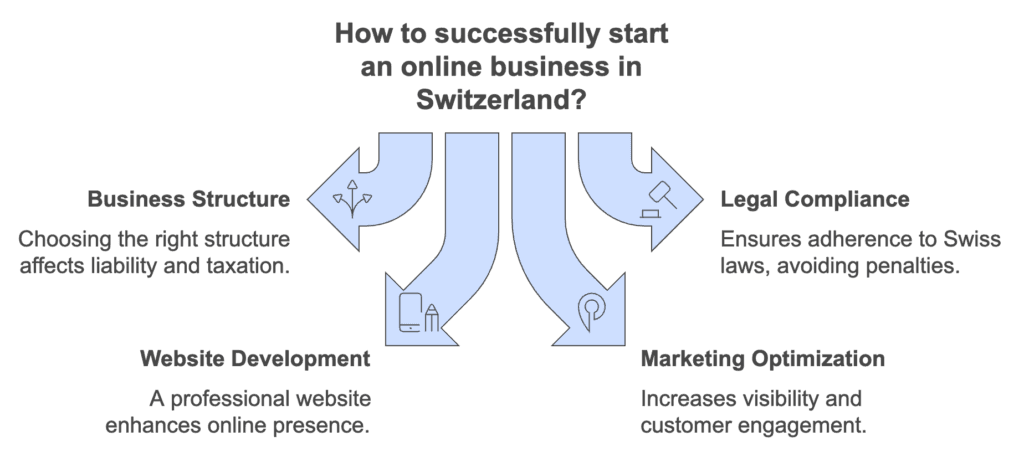Switzerland is a prime location for entrepreneurs looking to start an online business. With its high-quality digital infrastructure, affluent customer base, and supportive legal environment, Switzerland offers an ideal landscape for online ventures. In this guide, you’ll discover everything you need to know to start an online business in Switzerland, from selecting the right business structure to handling taxes, marketing, and building a professional website.
1. Introduction: The Swiss Digital Market
The Swiss e-commerce market has seen significant growth, with consumers increasingly choosing online shopping for convenience and variety. Switzerland’s robust economy, combined with high purchasing power and internet penetration, offers an excellent foundation for online businesses. However, starting an online business here requires careful planning to meet local regulations and appeal to a discerning audience.
2. Choosing Your Business Structure
The first step is selecting a suitable business structure. Switzerland offers various options, each with specific advantages and obligations. Here’s an overview of the main structures:
| Business Structure | Description | Benefits | Drawbacks | Best For |
|---|---|---|---|---|
| Sole Proprietorship | Operated by a single individual; not a separate legal entity | Simple setup; full control | Unlimited personal liability | Freelancers, small startups |
| GmbH (Limited Liability Company) | Separate legal entity; limited liability for owners | Liability protection; professional image | Higher setup cost; requires CHF 20,000 in capital | Medium-sized businesses |
| Corporation (AG) | Public limited company; often larger businesses | Limited liability; good for raising capital | Complex setup; high regulatory requirements | Large businesses, high-risk ventures |
When choosing a structure, consider your business goals, potential risks, and growth plans. For small online businesses or solo projects, a sole proprietorship may be ideal. However, if you plan to scale or need liability protection, a GmbH (Gesellschaft mit beschränkter Haftung) offers a solid option, especially if you’re seeking external investors.
3. Legal and Regulatory Requirements
Switzerland has specific laws designed to protect consumers and ensure data privacy, especially for online businesses.
Business Licenses and Permits
While most e-commerce businesses don’t need a special license, always check for industry-specific requirements. Certain products, such as food or medical supplies, may need additional permits. Additionally, cantonal regulations vary, so verify requirements with your local canton, especially if you’re establishing your online business in Zurich or Geneva.
Data Protection and GDPR Compliance
Switzerland enforces data protection laws similar to the General Data Protection Regulation (GDPR) in the European Union. Your online business must handle customer data responsibly, which includes securing personal data and providing a transparent privacy policy. Non-compliance can result in significant penalties, so this is essential for building customer trust.
Consumer Protection Laws
Swiss consumer protection laws mandate clear information on product descriptions, pricing, returns, and customer service. Ensure your website has accessible terms and conditions, a refund policy, and reliable customer support.
4. Setting Up Your Online Store
Building a professional, user-friendly website is crucial. If you’re looking to create a high-quality website at a reasonable price, Clear Web Design offers excellent Swiss web design services starting at CHF 599. They specialize in creating professional websites tailored to small businesses and startups, including e-commerce solutions. For more details on their pricing, visit their Swiss Web Design Solutions.
E-commerce Platforms
Choose a reliable e-commerce platform that matches your business needs. In Switzerland, Shopify and WooCommerce are popular options, offering extensive customization and built-in payment gateways. Alternatively, Swiss-specific platforms may be worth exploring if you aim to cater to a Swiss-only audience.
Website Design and Development
Investing in a professional design is essential, as Swiss consumers value aesthetics and efficiency. Your website should be mobile-friendly, load quickly, and have an intuitive layout to attract and retain customers. Clear Web Design can help you create a visually appealing, responsive website that meets these needs.
Payment Gateways
Secure and convenient payment options are crucial. Popular options in Switzerland include TWINT (a widely used mobile payment app), PayPal, and Stripe. Providing multiple payment methods improves your chances of converting Swiss customers, as they appreciate flexible payment options.
5. Marketing Your Online Business in Switzerland
Effectively marketing your online business helps build brand awareness, drive traffic, and generate sales. Here are some strategies to consider:
SEO Strategies for Swiss Audiences
Search engine optimization (SEO) is key to attracting traffic to your website. To reach Swiss customers, focus on keywords like “Start online business Switzerland,” “Online business ideas Switzerland,” and location-specific terms such as “online business Zurich.” Consider using multilingual SEO if targeting Swiss German, French, and Italian speakers to broaden your reach.
Social Media Marketing
Social media platforms such as Instagram, Facebook, and LinkedIn are popular among Swiss users and are ideal for building brand awareness. Tailor your content to align with local trends and cultural preferences, especially if targeting specific cantons. Paid advertising on social platforms can also be an effective way to reach a targeted Swiss audience.
Email Marketing
Email marketing remains a powerful tool in Switzerland. Build an email list by offering valuable content or promotions, then nurture leads with personalized email campaigns. Use email to announce new products, share blog posts, or offer special deals, which can lead to higher engagement and sales.
6. Taxes and Accounting for Swiss Online Businesses
Navigating the Swiss tax system is essential for online business owners. Switzerland’s tax obligations include income tax, VAT, and accounting requirements, which vary based on your business structure and location.
Income Tax and VAT Obligations
Swiss businesses are subject to both federal and cantonal income taxes, with rates varying by canton. Choosing a location with favorable tax rates, such as Zug or Nidwalden, can reduce your tax burden.
Additionally, beginning January 1, 2024, the VAT rates in Switzerland will be:
- Standard VAT rate: 8.1% (increased from 7.7%)
- Reduced VAT rate: 2.6% (increased from 2.5%)
- Special VAT rate for accommodation: 3.8% (up from 3.7%)
You must register for VAT if your business’s annual revenue exceeds CHF 100,000 and regularly file VAT returns. Be sure to factor these changes into your financial planning.
Accounting Software
To maintain accurate financial records, consider using accounting software that aligns with Swiss regulations. Options like Sage, QuickBooks, and Swiss-specific Bexio simplify tracking income, expenses, and VAT compliance. A solid accounting system also aids in end-of-year tax filing and makes financial management more efficient.
7. Success Stories: Inspiring Swiss Online Businesses
Learning from successful online businesses in Switzerland can provide valuable insights. Here are a few standout examples:
- Digitec Galaxus: A leading online marketplace in Switzerland for electronics, household items, and more. They excel in customer experience, fast shipping, and a wide range of products.
- Farmy.ch: A niche e-commerce business focusing on organic and local groceries. Farmy’s dedication to sustainability and quality has made it a popular choice among Swiss consumers.
- La Redoute Switzerland: A fashion and home goods retailer that has successfully localized its brand for the Swiss market by offering efficient delivery and easy returns.
These businesses demonstrate the importance of understanding Swiss consumer preferences, optimizing logistics, and providing top-notch customer service.
8. Swiss-Specific Considerations
Understanding Swiss consumer behavior and preferences can make a big difference in your success. Here are some factors to consider:
- Languages: Offering content in German, French, and Italian is advantageous to reach customers across all Swiss regions.
- Local Payment Preferences: Swiss consumers often prefer TWINT, PayPal, and credit cards, so integrating these payment options can improve customer satisfaction.
- Cultural Sensitivity: Switzerland values precision, reliability, and quality. Reflecting these values in your product offerings and marketing efforts can enhance your brand’s reputation.
Conclusion: Key Takeaways and Next Steps

Starting an online business in Switzerland is both rewarding and challenging. With the right preparation, you can navigate the Swiss market successfully. Here’s a quick recap:
- Choose the Right Business Structure: Determine the structure that aligns with your goals, such as a sole proprietorship or GmbH.
- Follow Legal Requirements: Meet Switzerland’s data protection and consumer protection standards to stay compliant.
- Create a Professional Website: Partner with a trusted web design company like Clear Web Design, offering high-quality services at affordable rates, starting at CHF 599.
- Optimize for Marketing: Use SEO, social media, and email marketing to reach your target audience.
- Manage Taxes and Accounting Efficiently: Keep track of VAT, income tax, and utilize accounting software to maintain compliance.
With this guide, you’re well on your way to starting a successful online business in Switzerland. For personalized assistance, consider consulting a local business advisor or tax professional to guide you through Swiss-specific requirements and opportunities. Starting with a clear plan can help you tap into the potential of the Swiss market with confidence.



